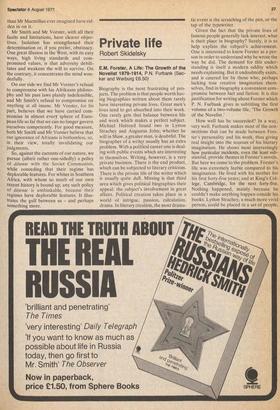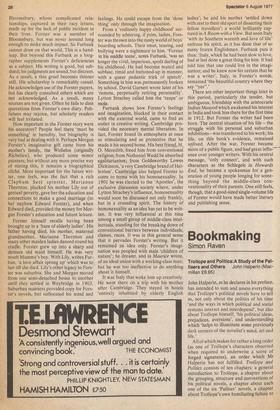Private life
Robert Skidelsky
E.M. Forster, A Life: The Growth of the Novelist 1879-1914, P.N. Furbank (Sacker and Warburg £6.50) Biography is the most frustrating of projects. The problem is that people worth having biographies written about them rarely have interesting private lives. Great men's lives tend to get absorbed into their work. One rarely gets that balance between life and work which makes a perfect subject. Michael Holroyd found two in Lytton Strachey and Augustus John; whether he will in Shaw, a greater man, is doubtful. The biographer of a writer usually ilas an extra problem. With a political career one is dealing with public events which are interesting in themselves. Writing, however, is a very private business. There is the end product, which can be subjected to literary criticism. There is the private life of the writer which is usually quite dull. Missing is that third area which gives political biographies their appeal: the .subject's involvement in great affairs. Political creation takes place in a world of intrigue, passion, calculation, drama. In literary creation, the most drama
tic event is the scratching of the pen, or the tap of the typewriter.
Given the fact that the private lives of famous people generally lack interest, what is their place in biography? Surely, it is to help .explain the subject's achievement. One is interested to know Forster as a person in order to understand why he wrote the way he did. The demand for this understanding is itself a modern oddity which needs explaining. But it undoubtedly exists, and is catered for by those who, perhaps lacking true creative imagination themselves, find in biography a convenient compromise between fact and fiction. It is this justification for writing about Forster which P. N. Fut:bank gives in subtitling the first volume of a two-volume life, `The Growth of the Novelist.'
How well has he succeeded? In a way, very well. Furbank makes most of the connections that can be made between Forster's personality and his work, thus giving real insight into the sources of his literary imagination. He shows most interestingly how particular incidents, even the least substantial, provide themes in Forster's novels. But here we come to the problem. Forster's life was extremely feeble compared to his imagination. He lived with his mother for his first forty-five years; and at King's College, Cambridge, for the next forty-five. Nothing happened, mainly, because he couldn't make anything happen outside his books. Lytton Strachey, a much more vivid person, could be placed in a set of people,
Bloomsbury, whose complicated relationships, captured in their racy letters, made up for the lack of public incident in their lives, Forster was a member of Bloomsbury, but was never around long enough to make much impact. So Furbank cannot draw on that world. This is a handicap. But beyond this Furbank as a biographer supplements Forster's deficiencies as a subject. His writing is good, but subdued; his judgments are sound, but discreet. As a result, a thin gruel becomes thinner still. His scholarship is remarkably casual. He acknowledges use of the Forster papers, but has clearly consulted others which are not acknowledged. As a result, many sources are not given. Often he fails to date quotations from Forster's own diary. Publishers may rejoice, but scholarly readers will feel irritated.
How important in the Forster story were his ancestors? People feel there 'must be something' in heredity, but biography is very bad at dealing with it. Perhaps Morgan Forster's imaginative gift came from his mother's family, the Wichelos (originally Richelieu), who produced some minor painters; but without any more precise way of stating this, it remains a biographical cliché. More important for the future writer, one feels, was the fact that a rich Clapham Sect spinster, Marianne Thornton, plucked his mother Lily out of genteel poverty, gave her the education and connections to make a good marriage (to her nephew Edward Forster), and when Edward died, provided the money for Morgan Forster's education and future leisure.
Forster himself recalls having been brought up in a 'haze of elderly ladies'. His father having died, his mother, maternal grandmother, Marianne Thornton and many other maiden ladies danced round his cradle. Forster grew up into a sharp and demure old maid himself. He was very much Mummy's boy. With Lily, writes Furban, 'a love affair sprang up' which was to last till she died. Lily's other legacy to Forster was suburbia. She and Morgan moved from one semi-detached house to another until they settled in Weybridge in 1903. Suburban mamiers provided copy for Forster's novels, but suffocated his mind and feelings. He could escape from the 'done thing' only through the imagination.
From a 'radiantly happy childhood' surrounded by admiring, if prim, ladies, Forster was thrown into the nasty world of boys' boarding schools. Their smut, teasing, and bullying were a nightmare to him. 'Forster in his middle teens', notes Furbank, 'was no longer the vivid, imperious, spoilt darling of his childhood. He had become muted and subfuse, timid and buttoned-up in manner, with a queer pedantic trick of speech'. Something in him was permanently broken by school. David Garnett wrote later of his 'remote, perpetually retiring personality'. Lytton Strachey called him the 'taupe' or mole.
Furbank shows how Forster's feelings and imagination, blocked in their contact with the external world, came to find an outlet in creative writing. Cambridge provided the necessary mental liberation. In fact, Forster found its atmosphere at once so stimulating and so protective that he made it his second home. His best friend, H. 0. Meredith, freed him from conventional religion; from Nathaniel Wedd be absorbed egalitarianism; from Goldsworthy Lowes Dickinson, 'a very Cambridge brand of Hellenism'. Cambridge also helped Forster to come to terms with his homosexuality. In 1901 he was elected to the 'Apostles', the exclusive discussion society where, under Lytton Strachey's influence, homosexuality would soon be discussed not only frankly, but in a crusading spirit. The history of homosexuality as an idea has yet to be written. It was very influential at this time among a small group of middle-class intellectuals, standing for the breaking down of conventional barriers between individuals, classes, races. It was in this general sense that it pervades Forster's writing. But it remained an idea only. Forster's imagination was peopled with male 'children of nature'; he dreamt, and in Maurice wrote, of an ideal union with a working-class man; but he was too ineffective to do anything about it himself.
It was Italy that woke him up creatively. He went there on a trip with his mother after Cambridge. They stayed in hotels 'entirely inhabited by elderly English
ladies'; he and his mother 'settled down with zest to their old sport of dissecting their fellow travellers'; a world brilliantly captured in A Room with a View. But soon Italy 'with its Southern warmth and love of life' unfroze his spirit, as it has done that of so many frozen Englishmen. Furbank puts it thus: 'Italy, which he had been slow to love, had at last done a great thing for him. It had told him that one could live in the imagination; and he knew now for certain that he was a writer'. Italy, in Forster's words, remained 'the beautiful country where they say "yes".'
There are other important things later in this period, particularly the tender, but ambiguous, friendship with the aristocratic Indian Masood which awakened his interest in India and took him there for the first time in 1912. But Forster the writer had been born. The central situation of his life — the struggle with his personal and suburban inhibitions—was transferred to his work; his life, on this book's evidence, remained unlived. After the war, Forster became more of a public figure, and had great influence over younger writers. With his central message, 'only connect', and with such characters as the Schlegels in Ho wards End, he became a spokesman for a generation of young people longing for something beyond the middle-class conventionality of their parents. One still feels, though, that a good-sized single-volume life of Forster would have made better literary and publishing sense.











































 Previous page
Previous page